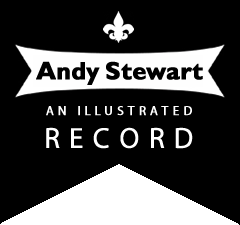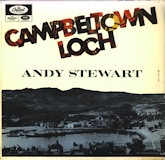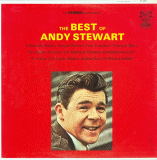Andy Stewart Discography
EMI Recordings (1965-1966)
Andy’s record sales continued strongly during 1965, including ‘Dr. Finlay’, a single that would provide his final UK “chart hit” of the sixties. 1966 would see the first of his many “Best-Of” compilations.
Heather Bells
This Extended-Play (EP) revolves around the popularity of ‘Heather Bells will Bloom Again‘ which makes its second appearance on record here. Filling out the rest of the disc are three tracks recorded over a span of two years but unreleased until this issue.
The opening track of side one is ‘The Long Road Back Hame‘ recorded in 1964. Erroneously credited to Stewart, this song (actually ‘The Lang Road Back Hame’) was another track written by Andy’s old friend “The Scottish Fiddler” Jock Morgan. Andy turns out a spirited rendition of a song that has subsequently been recorded by many Scottish artists.

The next track ‘Ladies’ Choice (Cadam Woods)‘ is the real gem of this quartet. Never included on any album this very rare track should be regarded as a genuine Stewart “classic”. Using the familiar formula of taking a well-known Scottish tune and breathing new life into it with fresh lyrics, Andy truly makes the song his own. Reminiscent of ‘McGinty’s Meal and Ale’ in its “slowing-down and speeding-up” delivery, Andy heads full-steam (“steaming” in the Scottish sense too) to the end of the song ending up with seventeen fiancés!
A Stewart-Grant original ‘The Jolly Ploughboys‘ (a re-write of the Willie Kemp ballad ‘The Jolly Pleughboys’) is a lively jig recorded in 1963 regarding life down-on-the-farm, ends the disc in fine fashion.
The front sleeve of this EP features Andy from the same photo session that produced the sleeve for the album ‘Songs of Scotland’ (1963).
Stereo mixes of these tracks were never released in the UK, although true stereo mixes appeared of ‘Heather Bells will Bloom Again’ – on the Canadian version of the ‘Campbeltown Loch’ LP (1965), and ‘The Jolly Ploughboys’ – on the US album ‘Tunes of Glory’ (1964).
Year of Release: 1965
Label: HMV
Catalogue Number: 7EG 8886 (Mono)
THE LONG ROAD BACK HAME (Morgan)
With Orchestra conducted by Brian Fahey.
LADIES’ CHOICE (Cadam Woods) (Stewart)
With Orchestra conducted by Brian Fahey.
HEATHER BELLS WILL BLOOM AGAIN (Stewart)
With the Michael Sammes Singers. With Orchestra conducted by Brian Fahey.
THE JOLLY PLOUGHBOYS (Stewart-Grant)
With Orchestra conducted by Brian Fahey.
Dr. Finlay
Dr. Finlay was the title character in the BBC TV show ‘Dr. Finlay’s Casebook’, a popular Scottish programme based around a GP’s practice set in the fictional village of Tannochbrae. The main characters were Dr. Finlay – the new young doctor, the elder Dr. Snoddie, the senior partner Dr. Cameron and Janet, the housekeeper.
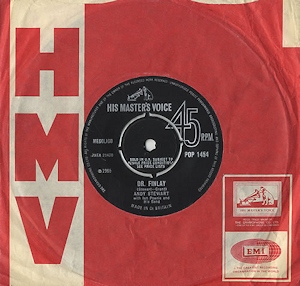
“Kenneth McKellar was the man responsible for my impersonations of the Tannochbrae Doctors and Janet. We were appearing together in a television show and Kenneth suggested I should write a sketch based on ‘Dr. Finlay’s Casebook’. I played Dr. Cameron, Kenneth was Dr. Snoddie, and the sketch was a riotous success. Immediately after the show, I went home and wrote this song. Janet sings the second verse, Snoddie has the third, and Dr. Cameron puts Finlay in his place in the final verse.”
‘Dr. Finlay‘ provided what would be Andy’s final UK “chart hit” of the 1960’s – he wouldn’t have another until 1989 nearly twenty-five years later. On this track Andy is backed by his touring group Ian Powrie and his Band and the track is supposedly recorded in front of a live audience, this is doubtful however, but the finished production is very effective.
By 1965 the TV series was a great success being networked over the UK and Andy’s “tribute” song spent five weeks in the top fifty, peaking at number 43.
‘Oh! What a Ceilidh‘ marks the first appearance of Alan Roper as conductor providing a taste of things to come on the next LP ‘Campbeltown Loch’. This tale of the wild goings-on during a fictional four-month-long ceilidh is one of the strongest “Stewart-Grant” compositions and would not have been out-of-place as an “A” side, indeed Canada considered it so good they included it on their 1968 ‘Best Of’ compilation.
It appears that no stereo mix exists of ‘Dr. Finlay’, although two electronically simulated mixes were later created. One created in the UK and featured on many compilation albums, and a “Duophonic” mix created for the Canadian ‘Best of’ compilation in the late sixties. Both are inferior when compared to the original mono mix.
‘Oh! What a Ceilidh’ appears in true stereo on the Canadian version of the ‘Campbeltown Loch’ LP (1965) and the US album ‘A Wee Bit O’ the Highlands’ (1965).
Year of Release: 1965
Label: HMV
Catalogue Number: POP 1454 (Mono)
DR. FINLAY (Stewart-Grant)
With Ian Powrie and His Band.
OH! WHAT A CEILIDH (Stewart-Grant)
With Orchestra conducted by Alan Roper.
Highest UK Chart position: 43
Campbeltown Loch
Although unusually titled (as the LP does not contain the hit song of the same name) ‘Campbeltown Loch’ is one of Andy’s finest collections of recordings. Boasting great production, fine arrangements, detailed orchestrations and a choice of songs reflecting the complete range of Andy’s talent, undeniably this album is the other contender for the title of Andy’s best album (alongside ‘Songs of Scotland’, 1963).
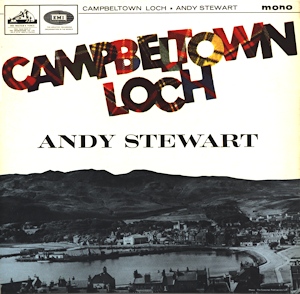
The wonderful ‘Oh! What a Ceilidh‘, a song which had already proven it’s worth as the B-side to the ‘Dr. Finlay’ single, kicks off side one and is followed by the first of the seven traditional songs on the LP ‘Turn Ye to Me‘. The original Hebridean melody was first published in 1816 with lyrics added by the Scottish writer John Wilson under his pseudonym Christopher North. This mournful song deals with themes of life, nature and death and this choice of song alone, should give the listener an insight that there is a whole lot more to Andy Stewart than songs about missing trousers.
‘Heather Bells will Bloom Again‘ makes its third appearance on disc in under twelve months cementing its position as a new favourite in the Stewart catalogue and is followed by another traditional ‘Lassie Will Ye Go‘ also known as ‘Wild Mountain Thyme’, a song based on ‘The Braes of Balquidder’ by Robert Tannahill, a contemporary of Robert Burns. This re-written version by Francis McPeake was a source of controversy on the subject of plagiarism of the Tannahill version, but aside from any of that Andy turns in a great performance here with a great bass-note ending. ‘Courtin’ in the Kitchen‘ proves to be the rip-roaring number of this album, a traditional folk-song about the goings-on downstairs in an Irish gentry’s house. A bona-fide Stewart “classic”.
The first side closes with the truly haunting ‘She Moved Thro’ the Fair‘ with an exquisitely underplayed arrangement of flute and harp. This traditional Irish folk-song was adapted by the Irish poet Padraic Colum in the early 1900’s being a favourite of the gypsy travelling community. With a melody dating back to Mediaeval times, this song has been interpreted and understood by listeners in several different ways. It can be a tender song of love (“…Fondly I watched her move here and move there, and then she went homeward with one star awake, as the swan in the evening moves over the lake…”); or a song of desire and want (“Last night she came to me, my young love came in, so softly her treading her feet made no din, she laid her head on me and this she did say, it will not be long now, till our wedding day” – she has come to his bedroom late at night, unable to resist waiting until they are married, but with the excuse that, after all, they will be married soon…); or a tale of the supernatural (“Last night she came to me, my young love came in, so softly her treading, her feet made no din” – she is already dead, appearing to him as ghost and in saying to him “It will not be long now till our wedding day” she is foretelling the young man’s death).
Side two opens with the equally haunting ‘McPherson’s Farewell‘ another traditional re-written by Burns of the infamous ‘MacPherson’s Rant’ written by the Scottish outlaw James MacPherson (whose chief crime was being a gypsy – a criminal offence in Scotland) whilst awaiting execution and performed by MacPherson under the gallows before breaking his fiddle over his knee in defiance. It is said that he was illegally hanged fifteen minutes ahead of time as local authorities anticipated that a legal pardon was on its way. Andy performs the rant in a fittingly staunch manner.
‘Donald Dhu‘, the B-side of ‘Heather Bells will Bloom Again’ is followed by ‘The Banks of Sicily‘ with lyrics written by Hamish Henderson, an Intelligence Officer with the 51st Highland Division in Sicily during WWII. One evening he heard the Gordon and Blackwatch battalions playing ‘Farewell to the Creeks’ a tune composed by Pipe Major James Robertson during the First World War. Looking at the eerie lights of the town, whilst empathising with the mixed feelings in the minds of weary soldiers awaiting transportation for the Allied invasion of Normandy (“D-Day”), the lyrics began forming in his imagination. Andy, ably assisted by a wonderful arrangement, delivers a satisfying version that is both stirring and mournful at the same time.
‘The Wee Toon Clerk‘, a 19th century traditional with its familiar “Ricky-Dicky Doo-Dum Day” chorus is a delightful tale of an illicit liaison between boy and girl and a genuine “bothy ballad” favourite of the North East of Scotland. Here the song is embellished with a “musical-theatre” style arrangement. The final traditional song in this collection is ‘The Farmer’s Boy‘ a song first “collected” in the mid 19th century as a popular folk song in England and Ireland, but said to date from the 1600’s and sharing it’s tune with another folk song “Ye Sons of Albion”. The song is a simple tale of a young man, looking for work, being employed as a “farm-hand” and in time ending up marrying the farmer’s daughter and inheriting the farmland. The album ends with a Stewart original ‘Highland Paradise‘, a telling tale regarding the dangers in having “one more for the road”!
All-in-all a wonderful collection of songs from an artist definitely at the top of his game.
This album was only ever available in Mono in the UK, although international variants would contain most of the tracks in Stereo. It is worth noting that some of the tracks appear (to the discerning ear) to be very slightly different – presumably from different takes – when comparing Stereo to Mono. This is most evident in ‘The Wee Toon Clerk’ when Andy sings a slightly different line towards the end of each mix of the song.
Year of Release: 1965
Label: HMV
Catalogue Number: CLP 1891 (Mono)
OH! WHAT A CEILIDH (Grant-Stewart) / TURN YE TO ME (Trad. arr. Roper) / HEATHER BELLS WILL BLOOM AGAIN (Stewart) / LASSIE WILL YE GO (Trad. arr. Roper) / COURTIN’ IN THE KITCHEN (Trad. arr. Roper) / SHE MOVED THRO’ THE FAIR (Trad. Colum arr. Roper) / McPHERSON’S FAREWELL (Trad. Burns arr. Roper) / DONALD DHU (Stewart) / THE BANKS OF SICILY (Pipe Major Robertson-Henderson) / THE WEE TOON CLERK (Trad. arr. Roper) / THE FARMER’S BOY (Trad. arr. Roper) / HIGHLAND PARADISE (Stewart)
With Orchestra conducted by Alan Roper
Tartans by Courtesy of The Scotch House, Knightsbridge, S.W.1.
Campbeltown Loch
PLAY ALBUM (YOUTUBE)
International Variants: ‘Campbeltown Loch’ – Capitol Canada 1965 – features all songs in Stereo, except ‘The Farmer’s Boy’ which has been replaced with ‘Campbeltown Loch’. The Canadian release also offers the only chance to hear the true stereo version of the 45RPM single release of ‘Heather Bells will Bloom Again’.
A Wee Bit O’ The Highlands
This US-only release contains stereo versions of most of the ‘Campbeltown Loch’ tracks, minus ‘Heather Bells will Bloom Again’ and ‘Donald Dhu’. Instead, and of most interest to collectors, the album includes two tracks that would remain unreleased in the UK.
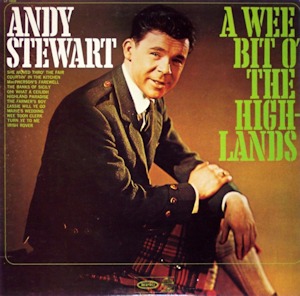
‘Marie’s Wedding‘ (‘Mairi’s Wedding’) is a popular Scottish folk song also known as ‘The Lewis Bridal Song’. It was first published in a volume of Scottish songs in the 19th century by Dr. Peter MacLeod, and the Glasgow Orpheus Choir’s conductor Sir Hugh Robertson wrote the English words in 1950.
The second unreleased track is the equally popular Irish folk song ‘Irish Rover‘ – a tale concerning the crew aboard, and the fate of, the eponymous sailing ship.
Year of Release: 1965
Label: EPIC
Catalogue Number: BF 19038 (Stereo) LF 18038 (Mono)
OH! WHAT A CEILIDH (Grant-Stewart) / THE FARMER’S BOY (Trad. arr. Roper) / MacPHERSON’S FAREWELL (Trad. Burns arr. Roper) / SHE MOVED THRO’ THE FAIR (Trad. Colum arr. Roper) / TURN YE TO ME (Trad. arr. Roper) / MARIE’S WEDDING (H.S. Robertson) / LASSIE WILL YE GO (Trad. arr. Roper) / THE BANKS OF SICILY (Pipe Major Robertson-Henderson) / WEE TOON CLERK (Trad. arr. Roper) / COURTIN’ IN THE KITCHEN (Trad. arr. Roper) / IRISH ROVER (Trad.) / HIGHLAND PARADISE (Stewart)
The Two Drums
‘The Two Drums‘ is a delightfully stirring song delivered from father-to-son, as the elder endeavours to instil the spirit and heritage of Scotland into his boy, using a useful metaphor of the “heederum-hoderum” sound of the drums of a marching band. Producer Walter J. Ridley gives the drums their appropriate presence and the Mike Sammes Singers make this song vaguely reminiscent of ‘Tunes of Glory’. (Incidentally this is one of the few Stewart recordings that fades out; most of Andy’s songs having “complete” endings).
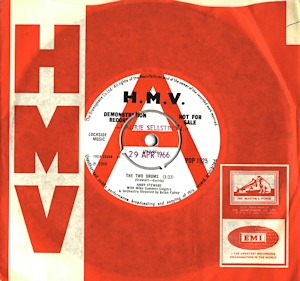
‘I’m a Rover‘ is a well-known folk song that is an excellent example of Andy taking a “traditional” and making it his own. Original versions of this song (also known as ‘The Heir O’ Linne’) have tales of illicit meetings between lovers, even elements of the supernatural, however Andy disperses with all of this and inserts his own verses turning the song into a cheekily jaunty celebration of drinking:
“My love was angry and did harang me, she said “It’s either the drink or me”, I’m very sad now I’m feeling bad now, to think how lonely she’s going to be!”
An undeservedly rarely heard track that, from its production “sound”, would have sat nicely amongst ‘The Songs of Scotland’ (1963).
Stereo mixes of these tracks were never released in the UK, although true stereo mixes of both appear on the US album ‘I’m Off to Bonnie Scotland’ (1966).
Year of Release: 1966
Label: HMV
Catalogue Number: POP 1525 (Mono)
THE TWO DRUMS (Stewart-Currie)
With The Mike Sammes Singers and Orchestra conducted by Brian Fahey.
I’M A ROVER (Trad: A. Stewart)
With The Michael Sammes Singers and Orchestra conducted by Brian Fahey.
Donald, Where’s Your Troosers?
Andy’s last Extended Play (EP) pairs together the A and B sides of two earlier hit singles. The reasoning behind this record being issued is unclear. However, released in June of 1966 it would be quickly followed up three months later with a full ‘Best-Of’ LP, making one guess that both of these records were issued for contractual reasons as Andy’s second contract with EMI was coming to an end, looking towards renewal.
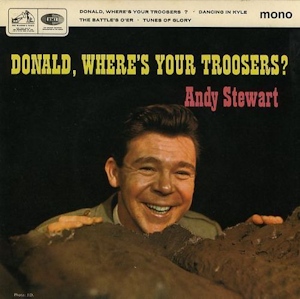
Year of Release: 1966
Label: HMV
Catalogue Number: 7EG 8950 (Mono)
DONALD, WHERE’S YOUR TROOSERS? (Stewart-Grant)
With The White Heather Group, directed by Robert Wilson.
DANCING IN KYLE (arr. Annie Shand Scott)
With The White Heather Group, directed by Robert Wilson.
THE BATTLE’S O’ER (Trad. Stewart- Arr. MacFadyen)
With the Michael Sammes Singers, Orchestra conducted by Bernard Ebbinghouse.
TUNES OF GLORY (Stewart-Grant)
With the Michael Sammes Singers, Orchestra conducted by Frank Cordell.
The Best of Andy Stewart
This is the first of many compilations that have been issued of Andy Stewart material. In a way it is a forerunner of the modern “greatest hits” compilation, in that it pairs the big selling “hits” with brand new recordings, thereby appealing to both audiences: the listener who wants the popular songs; and the fan who wants new recordings. Of the 14 tracks here, seven are old favourites and the other seven are brand new to disc. It may also have been issued to fulfil contractual obligations, as Andy’s EMI recording deal was coming towards an end. Regardless of any of this, the quality of the tracks both old and new are so high, it stands on its own merits as a fine “greatest hits” selection.

‘Mary Mack‘, the first new track, is a welcome addition to the Stewart catalogue being a tongue-twisting traditional folk song in the style of ‘McGinty’s Meal and Ale’ and ‘Ladies’ Choice’. ‘The Girl from Glasgow Toon‘ is an instant “Stewart-Grant” classic, with a chorus so infectious that it is hard to believe that it is not a “traditional”, and can easily be held up as one of the prime examples of the excellent material the partnership produced. “Let it rain, let it rain, let it rain – Let it rain, let it rain, let it pour – Since she’s said that she’s mine oh the sun’s gonna shine in my heart forever more”.
‘The Highlandman’s Umbrella‘ is a comic song by Thomas B. Shaw, first published in 1951, detailing the activities under one of Glasgow’s most famous landmarks, Central Station, and the large glass-walled bridge that extends over Argyll Street. This bridge would famously be the first place Highlanders from the North of Scotland would find themselves after alighting from their trains; the bridge providing shelter from the elements (and the first glimpses of Glasgow) to those looking for work in the big city. ‘I’m Off to Bonnie Scotland‘ is a typical Scots-type favourite with a theme of returning back home to the glens.
‘Scotland Yet‘ was written circa 1850 by Henry Scott Riddell, a Scottish Minister, an ode to the history and heritage of Scotland with a central theme of patriotism and freedom. Andy delivers the vocal with appropriate gravitas. ‘Farewell! 51st Farewell‘ is a powerful Stewart original; a tribute to the 51st Infantry Division, the forgotten soldiers of WWII left behind in France long after the last boat had left in the evacuation of Dunkirk. ‘Ho Ro My Nut Brown Maiden‘ rounds out the last of the new tracks on this album, a well-known highland folk song of the 19th century translated from Gaelic by the Scottish poet Professor John Stuart Blackie.
This fine collection of songs would provide the blueprint for every future EMI Andy Stewart ‘Best Of’ compilation.
This album was only ever available in Mono. A Stereo version with a catalogue number of CSD 3562 was advertised on the reverse of the 1969 LP ‘I Love to Wear the Kilt’, however this seems to have been in error. True Stereo versions of six of the new tracks (except ‘Farewell! 51st Farewell’, which has only ever been released in Mono) would turn up shortly on the US LP ‘I’m Off to Bonnie Scotland’ (1966).
Year of Release: 1966
Label: HMV
Catalogue Number: CLP 3562 (Mono)
CAMPBELTOWN LOCH (Trad.-MacMillan-Stewart) (a) / MARY MACK (Trad.-Flint-Stewart) (a) / A SCOTTISH SOLDIER (MacFadyen-Stewart) (b) / THE GIRL FROM GLASGOW TOON (Grant-Stewart) (a) / THE HIGHLANDMAN’S UMBRELLA (Shaw) (a) / I’M OFF TO BONNIE SCOTLAND (Moore-Grayson) (a) / THE BATTLE’S O’ER (Trad.-Stewart-arr. MacFadyen) (b) / SCOTLAND YET (Trad.-arr. Stewart) (a) / DR. FINLAY (Stewart-Grant) (d) / FAREWELL! 51st FAREWELL (Stewart) (a) / THE MUCKIN’ O’ GEORDIE’S BYRE (Trad.-adpt. Kemp) (b) / HO RO MY NUT BROWN MAIDEN (Trad.-arr. Stewart) (a) / DONALD WHERE’S YOUR TROOSERS? (Stewart-Grant) (e) / TUNES OF GLORY (Grant-Stewart) (c)
(a) with Orchestra and Singers, Conducted by Brian Fahey
(b) with Orchestra and Singers, Conducted by Bernard Ebbinghouse
(c) with Orchestra and Singers, Conducted by Frank Cordell
(d) with Ian Powrie and his Band
(e) with the White Heather Group, Directed by Robert Wilson
The Best Of Andy Stewart
PLAY ALBUM (YOUTUBE)
International Variants: ‘The Best of Andy Stewart’ (Capitol, Canada 1968) is definitely a variant of the UK album (it shares the same sleeve notes by Derek Johnson from the New Musical Express), but contains a very different track listing from its British counterpart. ‘Mary Mack’, ‘The Girl from Glasgow Toon’, ‘The Highlandman’s Umbrella’, ‘I’m Off to Bonnie Scotland’, The Battle’s O’er’, ‘Farewell! 51st Farewell’, ‘The Muckin’ O’ Geordie’s Byre’ and ‘Ho Ro My Nut Brown Maiden’ have all gone from the Canadian Release. In their place are: ‘Oh! What a Ceilidh’, ‘Highland Paradise’, ‘The Tartan Ribbon’, ‘Soldier Boy’ and ‘Two Lands’.
This album was originally released as a ‘Duophonic’ release – a new type of electronically created Stereo that sounded more realistic than the electronically created Stereo mixes typically used on UK albums in the 1970s. The 1980s re-pressing is simply marked Stereo, but on listening the whole album is in Mono!)
I’m Off to Bonnie Scotland
Another American release with no British equivalent, this album is a collectors’ delight, containing stereo mixes that were never issued in the UK and two tracks that remain totally unreleased in Britain: ‘It’s Nice to Get Up in the Morning‘ – a classic from the Harry Lauder songbook, originally recorded in the 1920’s and ‘Slàinte Mhath‘(incorrectly spelt on the record as “Slàinte McGrath”) – a “Stewart-Grant” original explaining and celebrating the Scottish Gaelic toast, “Good Health”.
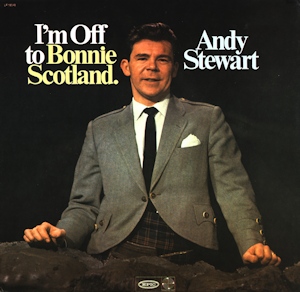
Year of Release: 1966
Label: EPIC
Catalogue Number: BF 19048 (Stereo) LF 18048 (Mono)
IT’S NICE TO GET UP IN THE MORNING (But It’s Nicer To Lie In Bed) (H. Lauder) / THE HIGHLANDMAN’S UMBRELLA (T.B. Shaw) / SOLDIER BOY (The Sunset Call) (Morgan) / SCOTLAND YET (Traditional – Arr. A. Stewart) / THE TWO DRUMS (Currie-Stewart) / THE GIRL FROM GLASGOW TOON (Grant-Stewart) / SLÀINTE MHATH (Grant Stewart) / I’M OFF TO BONNIE SCOTLAND (Moore-Grayson) / I’M A ROVER (A. Stewart – Music traditional) / MARY MACK (Traditional – Arr. Flint-Stewart)
Soldier Boy (The Sunset Call)
‘Soldier Boy‘ is another song by Jock Morgan – the Scottish Fiddler – this time a slow sentimental ballad developing into a gentle march, based around the “Sunset” Bugle Call, a trumpet signature of four notes, heard in army bases in British Commonwealth countries signifying the end of the military day. “Soldier Boy, Soldier Boy, you’re my dearest of all… my heart cries “God Bless You”, when I hear that old Sunset Call.”
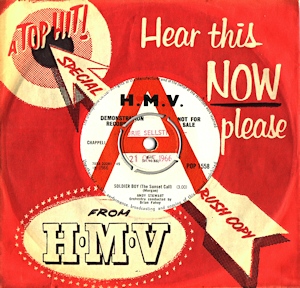
‘Scotland Yet‘, based on the poem by Henry Scott Riddell – Scottish Minister, makes a re-appearance as the B-side.
Stereo mixes of these tracks were never released in the UK, although true stereo mixes of both appear on the US album ‘I’m Off to Bonnie Scotland’ (1966).
Year of Release: 1966
Label: HMV
Catalogue Number: POP 1558 (Mono)
SOLDIER BOY (The Sunset Call) (Morgan)
Orchestra conducted by Brian Fahey.
SCOTLAND YET (Music Trad. Words & Arr. Andy Stewart)
Orchestra conducted by Brian Fahey.
